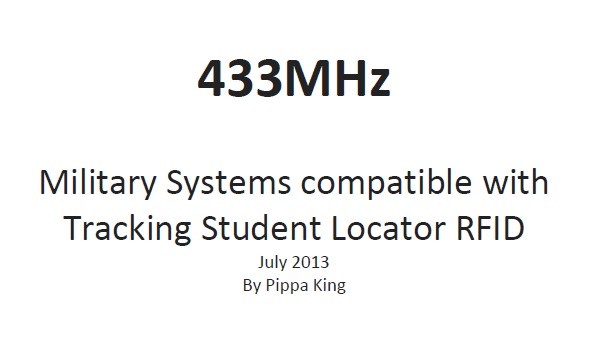 After nearly a year of being quiet about West Cheshire College tagging their students with RFID, a final update to round the story off as there have been some happenings behind the scenes. The monetary spend of £1,050,242 on ultra wideband RFID that ‘failed’ in it’s job to monitor the students, despite it being used by the military, is the language that speaks to UK parliament. The civil liberties lost and invasion of privacy the 14-19 year old, blissfully unaware, students suffered were ignored by the establishment.
After nearly a year of being quiet about West Cheshire College tagging their students with RFID, a final update to round the story off as there have been some happenings behind the scenes. The monetary spend of £1,050,242 on ultra wideband RFID that ‘failed’ in it’s job to monitor the students, despite it being used by the military, is the language that speaks to UK parliament. The civil liberties lost and invasion of privacy the 14-19 year old, blissfully unaware, students suffered were ignored by the establishment.
The Information Commissioner’s Office (ICO) did their job well in ensuring the college met it obligations under the Freedom of Information Act. It took time for me to get answers to my Freedom of Information requests but I got what information the college had in the end after involving the ICO. There was a distinct change of attitude with regards to co-operation from the college when there was a change of Principal early in 2013, maybe that is coincidence.
In February 2014, Tom Watson MP asked three written questions in parliament to the Department of Education about West Cheshire College’s use of RFID tagging students. As expected the Department of Education knew nothing about this. Hansard references here: Feb 4th, Feb 6th and Feb 10th.
After learning, from Freedom of Information requests, that the college had spent over a million pounds on untested, uncosted, undocumented, unstandardised RFID I contacted the Public Accounts Committee to report the cost. They passed the enquiry onto the National Audit Office who carried out an investigation into the unusual accounting of this spend. On the 10th November 2014 I received a letter from Margaret Hodge MP who oversees the Public Accounts committee:
“Inquiries made by the National Audit Office of the Skills Funding Agency suggest that the Agency have no knowledge of student tracking systems in operation at further education colleges. I understand from your previous communication that you have already received confirmation from the Department of Business Innovation and Skill and the Department of Education that they do not hold specific information on the tracking system in question and they they are not running and programmes to introduce such systems more widely in schools an colleges.
The National Audit Officer have highlighted to me previous weaknesses in the arrangements to access and manage capitol funding bids from further education colleges. At about the same time that West Cheshire College would have made its bid for new buildings broader concerns began to emerge about the then Learning Skills Council’s (LSC) overall management of the capitol programme. These concerns were brought to light in critical reports by Sir Andrew Foster and the Education Select Committee.
The LSC was disbanded in 2010 and it’s responsibilities, including management of further education capitol investment programme, were assumed by the Skills Funding Agency (SFA). A Cabinet Office review of the SFA’s investment programme in 2013 reported that the criteria for distributing grants had been developed in a way which promoted value for money.
In the absence of any further evidence of a wider problem the National Audit Office is not planning to undertake any further inquiries at this time.“
So a botched spend on flawed technology, mismanaged by the college and the government? Or the RFID industry using UK students at West Cheshire College, wearing RFID supplied and pioneered by Zebra Technologies, for the IEEE 802.15 4f standard approved February 2012, which Tim Harrington, the Vice President of Zebra Technologies, sat on the IEEE 802.15.4f working group on?
Whatever it is or is not the sorry episode is done, with students and parents non the wiser it ever happened. This practice of tagging students with RFID is common in the USA, let us hope the UK does not follow suit.










